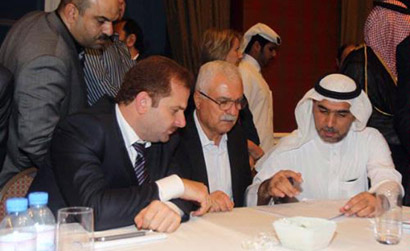The Syrian opposition early Tuesday named US-educated Syrian businessman Ghassan Hitto as provisional prime minister for parts of the country held by rebels, DPA reported.
Hitto, a communication executive, won 35 out of the 48 votes cast by opposition representives meeting at a conference in Istanbul, according to reports quoting a coalition member. He will start forming a government that will deal with issues in the Syrian rebel-held areas.
Syrian opposition conferees said that Hitto "was very capable" in dealing with the humanitarian and political issues of the Syrian people at this time. The selection of Hitto is the most serious effort to consolidate the rebellion against President Bashar al-Assad.
Hitto left Syria in the 1980s and lived with his family in the US. He has dual US-Syrian citizenship, but he recently moved to Turkey from Dallas, Texas in order to devote himself to help the Syrian refugees.
The meeting, postponed several times because of deep divisions within the National Coalition for Syrian Revolutionary and Opposition Forces, began Monday with the goal of tapping a prime minister.
The umbrella opposition group had listed nine premier candidates, including Syria's former agriculture minister, Assad Mustapha, and US-based Syrian Political and Strategic Institute chief Osama Kadi.
On Monday in Lebanon, a security source said that Syrian warplanes had bombed areas in eastern Lebanon, with at least two rockets striking a remote mountainous area between Lebanon's eastern Bekaa Valley and the Syrian-Lebanese border. There were no immediate reports of casualties.
The attack came a few days after Damascus warned Beirut that it would strike areas deep inside Lebanese territories if "terrorist gangs" continue to infiltrate Syria from Lebanon.
Arab League Secretary General Nabil al-Araby voiced frustration over the lack of UN Security Council action to stop the violence in Syria.
"Since April, we have been asking the Security Council to issue a resolution for ceasefire," he said, after meeting with international peace envoy Lakhdar Brahimi. "However, the Security Council is hesitant, and this is a major problem."
Russia and China, allies of al-Assad, have vetoed three UN Security Council resolutions against the Damascus regime since the March 2011 outbreak of unrest.
More than 70,000 people have been killed in the escalating conflict, according to conservative UN estimates.
In Washington, US Secretary of State John Kerry reiterated his government's willingness to allow other countries to provide military aid to Syrian rebels, though the US has not taken that step.
US President Barack Obama "has made it clear that the United States does not stand in the way if other countries have made a decision to provide arms, whether it's France or Britain or others," Kerry said.
He raised concerns about Syrian refugees "pouring" into Jordan, Lebanon and Turkey and "becoming a global catastrophe." The UN estimates that 1 million people have fled into neighbouring countries, with another 2.5 million Syrians displaced within the country.
Kerry warned that "the longer the bloodshed goes on, the greater the prospect that the institutions of the state of Syria implode."
In Syria, security forces arrested a number of Damascus University students, opposition activists said.
Security forces stormed the institute's residential complex after anti-government leaflets were distributed on campus. Opposition website All 4 Syria said pupils at a secondary school in the capital were also detained.
Egyptian President Mohammed Morsi and Pakistani President Asif Ali Zardari called for an end to the bloodshed in Syria, saying the territorial integrity of the war-torn country should be respected.
Morsi said he was in Islamabad "to support the stopping of bloodshed in Syria and to enable Syrians to attain their aspirations and be able to express them freely in an integrated Syria."
Zardari said: "The drive for peace in Syria must be led and owned by the Syrian people."






